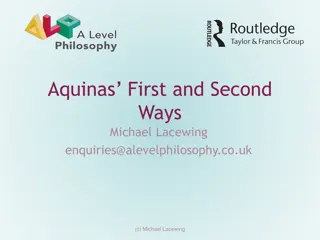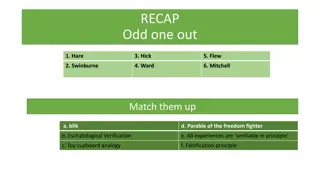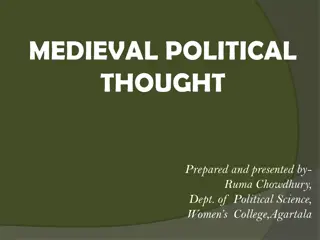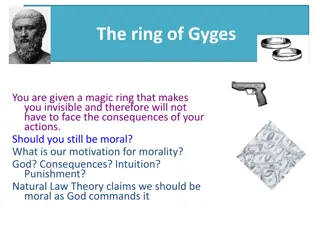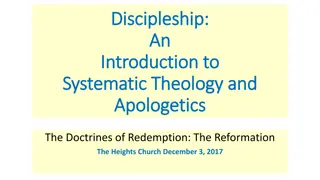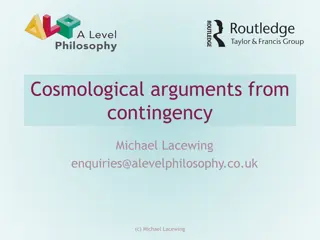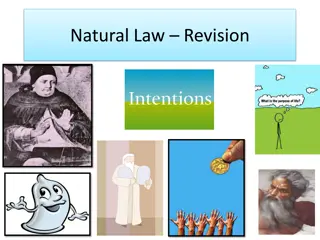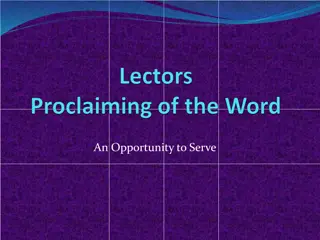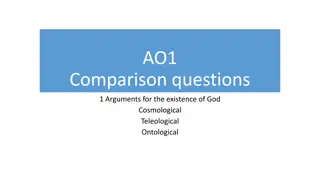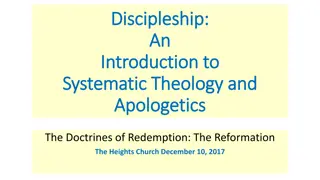Exploring Aquinas' Arguments for the Existence of God
Aquinas presents compelling arguments for the existence of God through the First and Second Ways, highlighting the necessity of a first cause and sustaining causes in the world. By delving into concepts of temporal and sustaining causes, Aquinas builds a philosophical framework that leads to the con
6 views • 16 slides
Understanding Religious Language: Analogy and Interpretation
Exploring the use of analogy and interpretation in religious language, this content delves into the views of St. Thomas Aquinas and Ian Ramsey regarding the challenges of conveying meaning through analogies. Aquinas rejected univocal and equivocal language for discussing God, emphasizing the limitat
0 views • 18 slides
Exploring Analogy and Religious Language in Philosophy
Dive into key terms like disclosure, qualifier, and models in the context of analogy and religious language as discussed by philosophers like Aquinas and Ian Ramsey. Explore concepts of language, analogy, and the application of human understanding to divine attributes.
0 views • 18 slides
Medieval Political Thought: Key Thinkers and Concepts
Explore the medieval political thought highlighting prominent thinkers like St. Augustine, St. Thomas Aquinas, and Marsilius of Padua. The period was characterized by universalism, the absence of organized states, and a blend of politics, economics, and religion. Discover the parallelism between Pla
3 views • 6 slides
Understanding Natural Law Theory: Morality and Divine Commands
Natural Law Theory, influenced by thinkers like St. Thomas Aquinas and Aristotle, posits that morality is derived from rational thought and divine commands. The theory emphasizes the importance of following moral absolutes to establish a right relationship with God and achieve eternal life. By study
1 views • 36 slides
Integrating Aristotle with Christianity: The Impact of Thomas Aquinas
The integration of Aristotelian philosophy into Christian theology by Thomas Aquinas in the 13th century had significant implications, enriching Christian scholarship and influencing key doctrines such as grace, predestination, and the existence of God through the teleological argument. Despite cont
0 views • 7 slides
Cosmological Arguments from Contingency Explained
Explore the concept of necessary and contingent existence, Aquinas' Third Way argument for the existence of God, objections to the causal principle, and the idea of a series of contingent things. Contemplate the question of why anything exists and whether God provides the answer.
0 views • 16 slides
Understanding Natural Law Theory: Aquinas's Perspective
Natural Law Theory, influenced by Aristotle and Christian ethics, asserts that there are universal norms based on intrinsic goodness. Aquinas emphasized the importance of human rationality, linking reason to moral precepts and virtues. The theory promotes the idea of a final purpose for humans and t
0 views • 20 slides
Reflections on Sacred Scriptures and Tradition
Delve into the significance of Sacred Scriptures and Tradition in the context of faith and the Church. Explore the teachings of St. Jerome, Thomas Aquinas, and the distinctions between Big T and little t traditions. Gain insights into the role of lectors and the importance of properly proclaiming th
0 views • 17 slides
Comparison of Arguments for the Existence of God
The comparison explores the Cosmological, Teleological, and Ontological arguments for the existence of God. It delves into the similarities and differences between key proponents such as Aquinas, Paley, William Lane Craig, and Tennant. Each argument is examined based on its form, empirical evidence,
0 views • 10 slides
Understanding Purgatory in Christian Theology
This article delves into the historical and doctrinal aspects of purgatory, focusing on the teachings of Thomas Aquinas and the developments within the Catholic Church. It explores the beliefs surrounding purification after death, the role of prayers and offerings, and the evolution of the concept o
0 views • 13 slides
Understanding Natural Law Theory and Moral Principles
Natural Law theory is based on the idea that the good aligns with fundamental design, prescribing moral behavior. Rooted in Aristotle's teleological view, it encompasses concepts like Aquinas' hierarchy of laws and natural inclinations. Qualifying principles such as the Doctrine of Double-Effect gui
0 views • 17 slides
